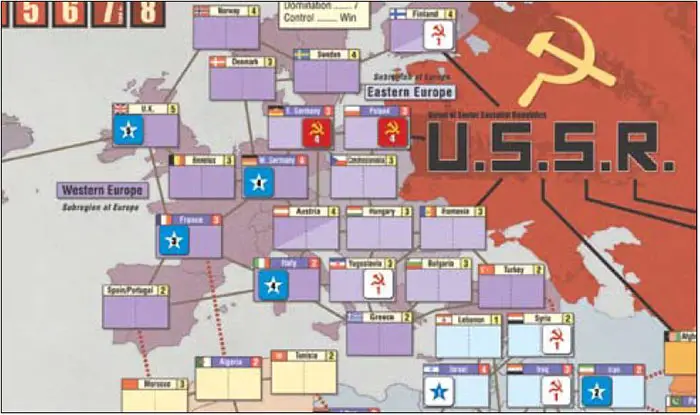
What follows is an example of play between Chris Withers and Stefan Mecay. In this game, none of the optional cards are in play.
Additionally, the two players have bid for sides. Chris wins the bidding and chooses the Soviets. Stefan takes the underdogs, but due to bidding his US begins the game with an additional four Influence Points. These points may only be placed in countries eligible for US Influence during the game setup.
To help players follow along, the number of Influence Points in a country after the action is performed is indicated in parenthesis. The number before the slash is US influence and the number after the slash is USSR influence (US/USSR). If the number is bold and with a "C", it indicates control.
Soviet Setup: 4 IP to Poland (0/4C), 1 IP to East Germany (0/4C), 1 IP to Yugoslavia (0/1).
US Setup: 2 IP to West Germany (2/0), 4 IP to Italy (4C/0), 1 IP to France (1/0); +Bonus Bid = 1 IP to Iran (2C/0), 2 IP to France (3C/0), 2 IP to West Germany (4C/0).
This is a fairly standard setup. Note that the decision on where to put your starting influence is made AFTER you examine your starting hand. The Soviets have locked down Poland and East Germany. They've put 1 Influence in Yugoslavia to threaten Italy and Greece. That 1 IP is always a risk, as it can be flipped by Independent Reds.
Stefan is attempting to deprive the Soviets of any obvious first coup locations by using the bid IPs to strengthen Iran. Furthermore, he has bolstered the US position in Western Europe, such that an initial European Scoring Card would result in US dominance.
Turn 1
Headline Phase
Soviet: olymPic gameS (2 Ops).
Us: mideaSt ScoRing (0 Ops).
In this phase both players choose a card from their hand. The event on that card will then be implemented. The card with the highest operations is implemented first. In the event of a tie, the US Card is implemented first.
Stefan has made a risky choice by playing the Mideast Scoring card right off the bat. Had the Soviets played a headline card that allowed them to place Influence, those IPs would certainly have plopped down in the Mideast making this stealth play a potential nightmare.
Unfortunately for Chris, his headline card is a non-threatening effort to nail a couple of early victory points.
The US Scores 4 for the Mideast Scoring (control of Iran) and the Soviets win the first post-war Olympics. The net result is US +2.
Action Rounds
USSR Action Round 1: NATO (4 Ops) to Coup Iran. Rolls 6, US influence = 0, Soviet Influence 4. Soviets gain 4 Mil Ops, and DEFCON drops to 4.
#1: At Start setup in Europe and upper Middle East.
This is the classical opening move. Iran is the linchpin to the US position to the Middle East and ultimately to the South Asian prizes of Afghanistan, Pakistan and India. Because of the extra influence from the starting bid, it takes a larger card to ensure success. Chris does so with a big roll. Mr. Truman must be asleep at the wheel while the dominoes are falling.
US Action Round 1: Formosan Resolution (2 Ops) as Influence points. Adds 1 to Malaysia (1/0) and 1 to Columbia (1/0).
Stefan appears to be creating a bit of a dilemma here for the Soviet player. He is threatening the key Asian battleground in Thailand while also threatening to break out in South America. Without an interesting event, the Soviet player can only deal with one of these problems via a coup.
The South American play is an illustration of mid-term planning. However, a key to good Twilight Struggle play is switching the tempo of the game by putting your opponent on the defensive. Doing so requires players to stop reacting, and engage in a little planning. That's exactly what Stefan is trying to do.
USSR Action Round 2: de-Stalinization (3 Ops) as the Event. Adds 1 to Chile (0/1), Venezuela (0/1), Thailand (0/1) and Malaysia (1/1) taken from Finland (0/0), Yugoslavia (0/0) and 2 from Iran (0/2).
Unfortunately for Stefan, Chris' Soviets have the perfect counter. Chris would probably have preferred to have a little more influence on the board before he started reshuffling it to deal with Stefan's challenge, but still, this will do. Suddenly, Chris is on the offensive in both South America and Asia.
US Action Round 2: containment (3 Ops) to Coup Thailand. Rolls 1, No effect. US gains 3 Mil Ops, and DEFCON drops to 3.
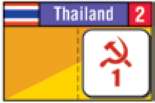
Swing and a miss. This was a major missed opportunity for the Americans. The Soviets felt compelled to move into Thailand even though it was still under a Coup threat given the DEFCON level. US success here would have truly grounded the American position in Asia. India and Pakistan would quickly be on the watch list. But it was not to be.
USSR Action Round 3: COMECON (3 Ops) as Influence points. Adds 1 to Thailand (0/2C), Venezuela (0/2C) and Afghanistan (0/1).
Chris uses the breather afforded by the Americans' failed coup in Thailand to solidify his position there, and in South American. It's a rocky start for the land of the free, and home of the brave.
US Action Round 3: UN Intervention (2 Ops) with Fidel (2 Ops) as the event. Coup in Venezuela. Rolls a 1, No effect. US gains 2 Mil Ops, and DEFCON drops to 2.
Wow, does someone need firing at the CIA! Again, the nice thing about the early Columbia/Malaysia pincer was that it put pressure on two different points. First the US tried to exploit Thailand and they got burned. Now, in a move that demonstrates the past is prologue, the US coups Venezuela for no effect. There are some very uncomfortable briefings at the White House.
USSR Action Round 4: Warsaw Pact Formed (3 Ops) as Influence points. Adds 1 to Brazil (0/1), Argentina (0/1) and Indonesia (0/1C). See Illustration #2.
The joy in Moscow over American misfortune has Mr. and Mrs. Khrushchev learning to mambo. The Soviets expand their movement in South America and tighten their grip on South East Asia.
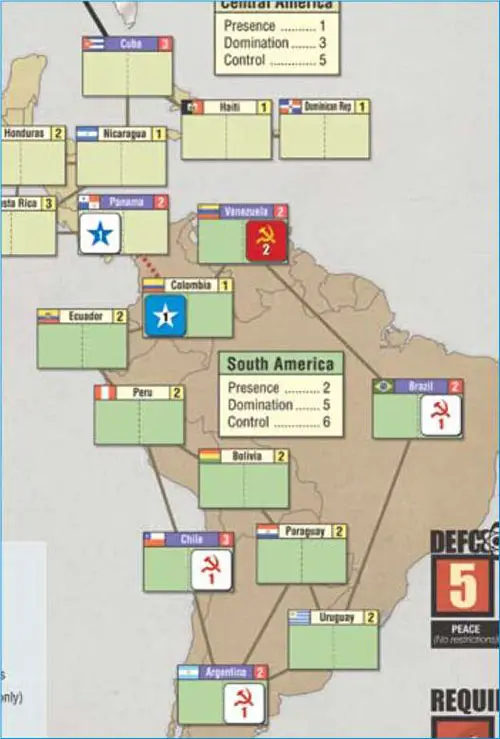
US Action Round 4: Europe Scoring (0 Ops). US gains 5 VP, for total of 7.
The player focus on the Midwar shows some impact here. US position in Europe has not really been touched. Stefan is free to grab a quick 5 points with Europe Scoring without much ado from the Soviets.
USSR Action Round 5: Truman Doctrine (1 Op US) as Influence Points. Adds 1 to Thailand (0/3C).
Chris plays a US event. Ordinarily, Truman Doctrine might have nipped Chris with the Soviet Influence in Yugoslavia. However, that Influence Point was removed earlier for De-Stalinization. So, though the US got the event, it had no effect and was discarded out of the deck.
US Action Round 5: Korean War (2 Ops USSR) as Influence Points. Adds 2 to South Korea (2/0).
Things are getting bad for the US. The Asian scoring card is still out there. If Stefan does not take some risks, it could be a short game. So, he plays Korean War and chances the roll. This time, the "1" roll works in his favor. The North Korean invasion has no effect. The futures of Hyundai and Samsung are secure. Furthermore, the US player uses the occasion to starting building a wall of his own.
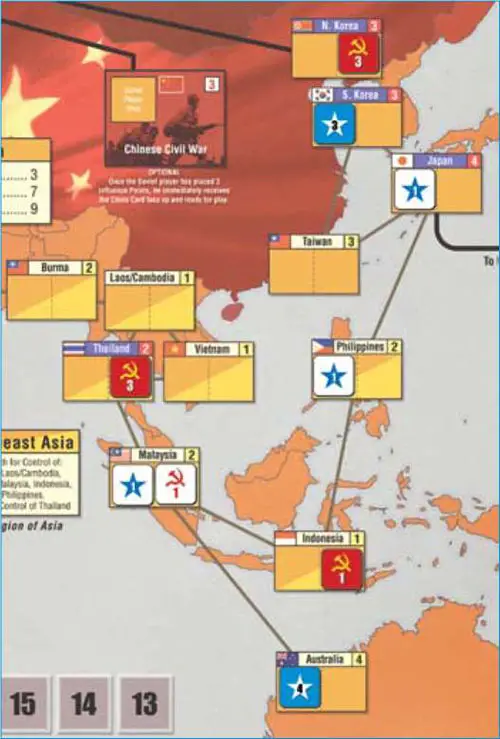
USSR Action Round 6: DeGaulle Leads France (3 Ops) as Influence Points. Adds 1 to Afghanistan (0/2C), 2 to Pakistan (0/2C).
Fearing the US player has the Asian scoring card, Chris reacts to Stefan's Korean gambit by attacking Asia's soft underbelly Pakistan. Furthermore, with Europe Scoring already played, President De Gaulle seems less appealing as an event play.
US Action Round 6: CIA Created (1 Op) as Influence Points. Adds 1 to Jordan (1/0). See Illustration #4.
The US wants to get back into the Middle East. He chooses Jordan as his entry point. Note that Stefan does not use the event. That's because he wants to keep it in the deck as a potential trap for the Soviet player. Furthermore, CIA Created is the kind of card you want to play at the beginning of the turn to maximize the value of the intelligence garnered.
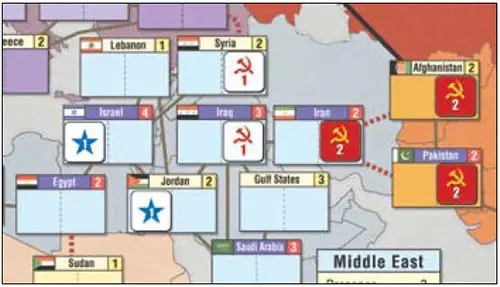
Turn 2
(DEFCON increases to 3, Mil Ops requirements met by both players, no lost points)
Headline Phase
Soviet: Red Scare (4 Ops).
US: Indo-Pakistani War (2 Ops).
Red Scare/Purge is a killer card and is almost reflexively played as a headline card if you get your hands on it. Chris does and looks to make turn two equally rough on the Americans. The will now lose 1 operations point from all cards played this turn.
Stefan is still watching out for Asian Scoring. By leading with Indo-Pakistani War he can potentially make that scoring card something to anticipate rather than dread.
American efforts, however, come up just a bit short. The modifiers on Indo-Pakistani War substract 1 from the die roll for every friendly controlled country adjacent to the target.
Stefan gambles big and goes for Pakistan (success would mean 2 VP and swapping Soviet Influence for American). However, Iran and Afghanistan are already in the USSR's orbit. So, the Americans need to roll a 6. They roll a 5. At least they get two Mil Ops out of the deal.
Action Rounds
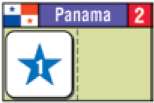
USSR Action Round 1: Arab-Israeli War (2 Ops) to Coup Panama. Rolls 5, US influence = 0, Soviet Influence 2. Soviets gain 2 Mil Ops, and DEFCON drops to 2.
The Soviet Player keeps his eyes firmly on a Midwar prize. Sensing blood in the water after turn 1, he tries to expand his foothold in Latin America into a power base. That would spell doom for the Americans in the Midwar. The cries of Yanqui go home get louder and louder down south. Additionally, by couping immediately and bringing DEFCON down to two, he prevents the US from targeting a battleground country for a coup.
US Action Round 1: Five Year Plan (2 Ops modified) as Influence points. Adds 2 to Saudi Arabia (2/0).
Stefan's rebuilding effort in the Middle East continues. He knows he's got avenues back into Latin America, but if he lets Chris shut him out of the Middle East it could be a problem that lingers the entire game.
USSR Action Round 2: Asia Scoring (0 Ops). Soviets gain 6 VP, for a total of 1.
Now we see how prescient Stefan's play for Pakistan was. Had he succeeded the whole tenor of this turn would have shifted. Now board position and victory points are beginning to align for the Soviets.
US Action Round 2: Romanian Abdication (1 Op USSR cannot be modified) as Influence point. Adds 1 to Saudi Arabia (3C/0).
Stefan is trying to make lemonade out of lemons. He gives Chris Romania (0/3C), which does not really upset the balance in Europe. While he earns a battleground country in the Middle East. A fair trade, and at least Red Scare can't hurt a 1 Op.
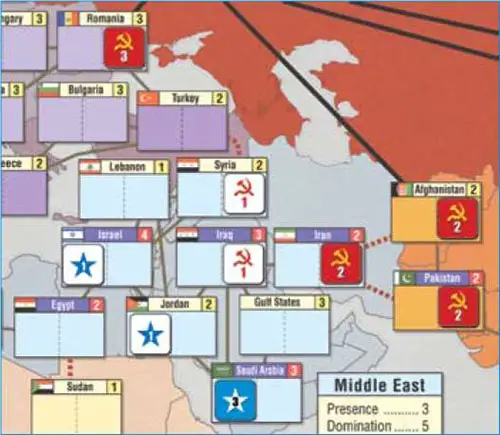
USSR Action Round 3: Decolonization (2 Ops) as the Event. Adds 1 to Burma (0/1), Angola (0/1C), Nigeria (0/1C) and Algeria (0/1).
Having already put the American's in a terrible spot, its time for the Soviets to serve up a dilemma. The American's are already behind in Latin America, how about adding Africa to their conundrum? decolonization is an absolutely vital breakout card for the Soviets, and one you hope to see in your own hand as the Americans.
Chris has played it well here as DEFCON is already at 2. Therefore, he can add influence to African battleground states with weak stability without fearing immediate US counter-coups.
US Action Round 3: Socialist Governments (2 Ops modified - USSR) on the Space Race. Rolls 1. Adds 2 VP for a total of 3.
All the big, Early War events have come out and they have all come out for the Soviets. Stefan has withstood a pounding already. At least he gets a little revenge by launching some "fellow travelers" from the Italian parliament into low earth orbit. Since he has used the card to roll on the Space Race track, the Soviet event is not implemented.
USSR Action Round 4: Duck and Cover (3 Ops - US) on the Space Race. Rolls 3. Adds 1 VP for a total of 2.
How do you say, anything you can do, I can do better in Russian? Duck and Cover, because of its DEFCON impact is a dangerous card to be holding when DEFCON is low. Besides the US has put a satellite up, can the Soviets just sit still for that?
US Action Round 4: Independent Reds (1 Op modified) as Influence point. Adds 1 to South Africa (2/0).
In a very quiet way, Stefan is clawing his way back in. He got a little breather himself with the Soviets needing to get duck and coveR out of their hand. He uses his one operation point to crawl towards presence in Africa.
USSR Action Round 5: Captured Nazi Scientists (1 Op) as Influence point. Adds 1 to Lebanon (0/1C).
Chris notes Stefan's improved position in the Middle East and begins to counter himself. Still, Captured Nazi Scientists is not a card I like to leave in the deck for my opponent to find later. Stefan's play obviously had the desired effect.
US Action Round 5: Suez Crisis (2 Ops modified - USSR) as Influence points. Adds 2 to France (3C/0).
This is an illustration of how a bad card can be defused by a good player. Suez Crisis is used by the Soviet player (Stefan allows him to go first) to remove 2 influence from France (1/0) and 2 from the UK (3/0).
Britain is in no immediate threat, so Stefan adds both influence back to France. European balance unchanged, and a threat to France is out of the deck. De Gaulle still lurks, however.
USSR Action Round 6: East European Unrest (3 Ops - US) as Influence points. Adds 1 to East Germany (0/4C) and 2 to Iraq (0/3C).
Similarly, but without the hindrance of Red Scare, Chris uses this card to actually strengthen his hand in the Middle East. He has not really contested Stefan's Domination of Europe. But he is keenly interested in all that oil! The US knock an Influence point out of Romania (0/2), Poland (0/3C) and East Germany (0/3C). Only the East German point is restored.
US Action Round 6: US/Japan Mutual Defense Pact (3 Ops modified) as Influence points. Adds 2 to France (5/0) and 1 to South Africa (3C/0).
I might have been tempted to play this card as the event under the circumstances. Securing Japan as a battleground for another potential Asian scoring next round seems appealing given the Red Scare.
But taking a 4 Op out of the US deck is never too appealing. In any event, Stefan's doubling down on France seems prudent with De Gaulle still out there and Europe being the one bright spot on the map for him. He has also successfully established a toehold in Africa.
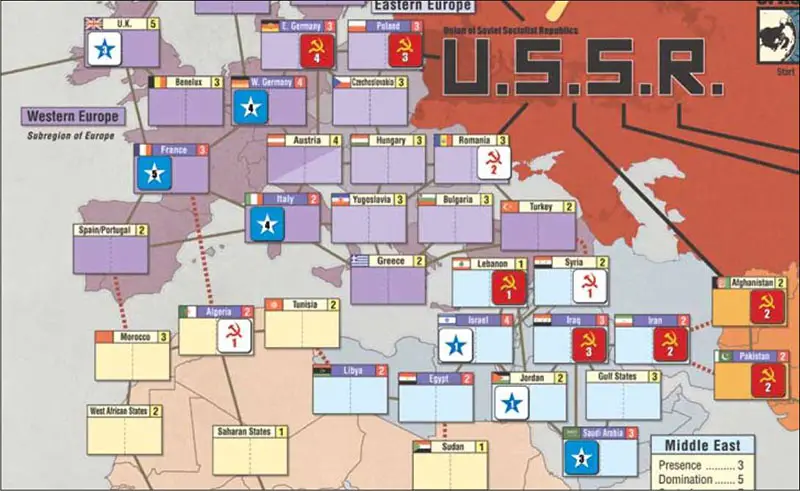
The Situation in Europe at the end of Turn 2.
Turn 3
(DEFCON increases to 3, Mil Ops requirements met by both players, no lost points. Deck reshuffled).
Headline Phase
US: Marshall Plan (4 Ops).
Soviets: Decolonization (2 Ops).
Ugh, not only has the Soviet player gotten all his big cards, Chris has nabbed decolonization twice! Nevertheless, Marshall Plan allows the American's to lock down their advantage in Europe. Stefan adds 1 to France (6C/0), W. Germany (5C/0), the UK (4/0), Spain (1/0), Greece (1/0), Turkey (1/0) and Benelux (1/0). The Soviets welcome more comrades to the revolution in Algeria (0/2C), Zaire (0/1C), South Africa (3C/1) and Malaysia (1/2).
Action Rounds
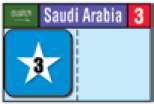
USSR Action Round 1: Defectors (2 Ops - US ) to Coup Saudi Arabia 32. Rolls 5, US influence = 2, Soviet Influence = 0. Soviets gain 2 Mil Ops, and DEFCON drops to 2. US gains 1 VP for a total of 3.
Chris is intent on controlling the tempo of coups-particularly since he controls some vulnerable states in Africa. Using Defectors on Saudi Arabia was never going to have much of an impact, and it didn't. However, his African holdings remain safe.
US Action Round 1: US/Japan Mutual Defense Pact (4 Ops) as Influence points. Adds 1 to Saudi Arabia (3C/0), 2 to Egypt (2C/0) and 1 to Greece (2C/0).
Well, holding on to US/Japan Mutual Defense Pact has already payed off with an immediate second use for Stefan. He takes a large stride forward and signals a potential European scoring by snagging Greece-not that Chris can do much about it at this stage. Our Alliance with the Chrysanthemum throne still awaits its turn in the deck.
Furthermore, he takes advantage of Chris' reflexive first round coup to slide influence into Egypt, further bolstering his chances in the Middle East.
USSR Action Round 2: Vietnam Revolts (2 Ops) as the Event. Adds 2 to Vietnam (0/2C). +1 to Ops in SE Asia.
Have we seen some signaling for another scoring card? Maybe he should have used the Defense Pact event after all? Perhaps not. Chris is already over the dominance hump for Asia. Getting that last battleground for the US to be competitive seems like a tall order with all the other fires to put out.
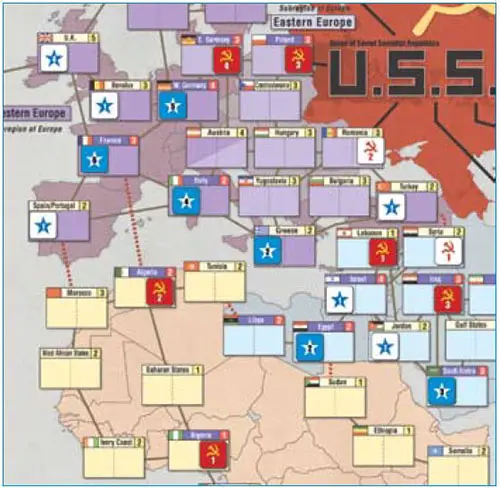
The Situation in Europe at the time of Europe Scoring.
US Action Round 2: Europe Scoring (0 Ops). US gains 5 VP, for a total of 8.
No surprises here. That should have been pretty clear with the otherwise unnecessary play into Greece.
USSR Action Round 3: Socialist Governments (3 Ops) as Influence points. Adds 1 to Burma (0/2C), Malaysia (1/3C) and 2 to Laos (0/2C) (including the Vietnam Revolts bonus).
If there was any doubt we were trading Europe Scoring for Asia Scoring this round, that card play settles it. Of course, timing being everything, there was not a ton of utility in playing the card as the event after Europe Scoring. Chris knows he won't see Europe Scoring again until the Midwar reshuffle, around the start of turn 7.
Chris' play in South East Asia improves his position both for Asia Scoring and also for the Mid War deck's, South East Asia Scoring card.
US Action Round 3: Olympic Games (2 Ops) as Influence points. Adds 2 to Israel (3/0).
Stefan is bound and determined not to let the Middle East fall away. He's got Europe, he's lost Asia. Things look pretty grim in Latin America and Africa. If he let's his position in the Middle East collapse, Chris is a shoe in. So, Israel is now increasingly safe against an Arab-Israeli War play, and therefore gets some US love.
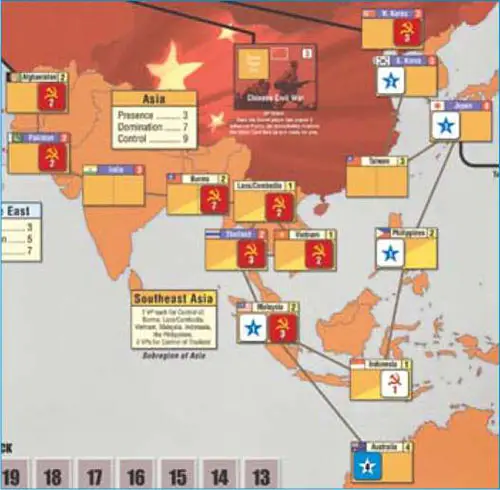
The Situation in Asia at the time of Asia Scoring.
USSR Action Round 4: Asia Scoring (0 Ops). USSR gains 6 VP, for a total of 2.
Again, no surprise. Chris telegraphed this move early with the Vietnam Revolts play. What is surprising is that despite some fine play by Chris and an excellent set of cards, the VP chart has not dipped into Soviet territory-yet.
US Action Round 4: Arab-Israeli War (2 Op) as Influence points. Adds 1 to Israel (4C/0) and 1 to Jordan (2C/0).
Very cleverly defused. Stefan uses the two ops from the card to take advantage of the modifiers on the event. Since he now controls Israel, Egypt and Jordan it is impossible for the Soviet die roll to succeed. Still, the Soviets do collect 2 Mil Ops out of the deal. A very nice tactical play that rendered a Soviet event useless while also improving Stefan's boots on the ground in the Middle East.
USSR Action Round 5: NATO (4 Ops - US) as Influence points. Adds 1 to Syria (0/2C), Brazil (0/2C) and 2 to Chile (0/3C).
The Soviets trigger NATO, but Europe is hardly his target, or concern, these days. Instead he parries a bit in the Middle East and turns up the heat in South America.
US Action Round 5: UN Intervention (2 Ops) with Blockade (1 Op) as the event. Adds 1 in Libya (1/0).
Ugh, I hate leaving blockade in the deck under any circumstances, but this is obviously better than playing it. Since blockade is a 1 Op, it does not meet the requirements for a Space Race roll. The move over to Libya signals Stefan's desire to dominate the Middle East, not just play defense. However, Nasser could make a mess of position in Egypt quite quickly.
USSR Action Round 6: Nuclear Test Ban (4 Ops) as Influence points. Adds 1 to Argentina (0/2C) and 3 to Costa Rica (0/3C).
Chris has smartly prepared himself for an immediate domination scoring of Central America. Control is not beyond belief here. If those scoring cards come out early, its going to be several tough turns for Stefan.
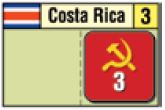
US Action Round 6: Nasser (1 Op - USSR) to Coup Costa Rica. Rolls 5. No Effect. US gains 1 Mil Op.
Ah, speak of the devil, there's Abdel now causing America pain in the Middle East (and a near miss in Costa Rica). Note that with such a low Op card versus such a high stability country, the object was not really to impact Costa Rica, but to avoid some of the VP penalty for failing to perform Mil Ops by the end of the round.
He cut the penalty in half and lost 1. However, he also had to give up control of Egypt. The Soviets now gain 2 Influence in Egypt (1/2) while US influence is cut in half to 1.
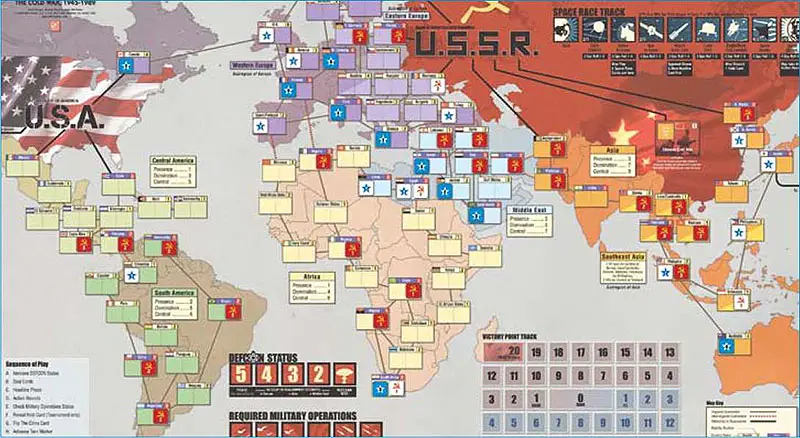
The Situation at the end of Turn 3.
The End?
Well, not really, but you didn't think I would reveal all the secrets of two of the best players in the game did you? Remarkably, Stefan went on to win this match in final scoring. Somewhere around turn 5 card and dice luck began to flip flop.
Suddenly Stefan was on fire, and Chris was pulling a lot of tough American events. Of course, if you play the game right, you leave all those tough events for your opponent to contend with exactly when he can least afford it. Surprising exactly no one, Stefan nabbed yet another Twilight Struggle Tournament title.
I would like to thank both Chris and Stefan for helping us illustrate how the game can be played and played well. I would also like to thank the Board Game Player's Association for hosting this tournament and others like it. They are a great service to all gamers.
Finally, I would like to express my particularly deep thanks to Randy Pippus. He is an excellent Twilight Struggle player in his own right, and helped Ananda and I immensely by providing a transcript of this final match.
Continue Reading
